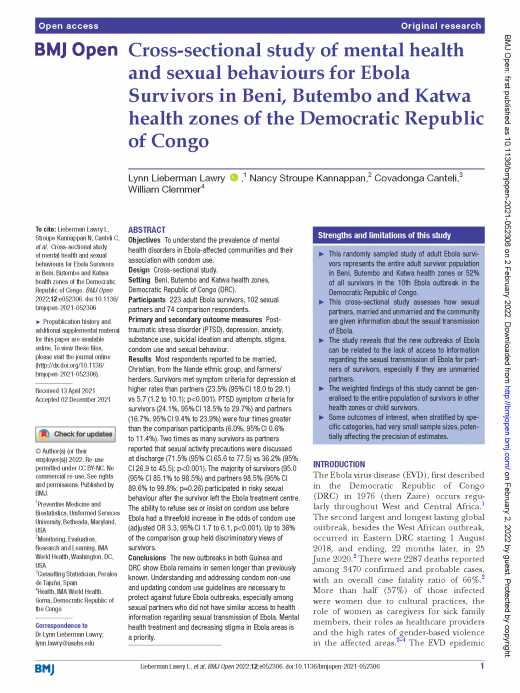Cross-sectional study of mental health and sexual behaviours for Ebola Survivors in Beni, Butembo and Katwa health zones of the Democratic Republic of Congo
Peer Reviewed Articles
Cross-sectional study of mental health and sexual behaviours for Ebola Survivors in Beni, Butembo and Katwa health zones of the Democratic Republic of Congo
Abstract
Objectives
To understand the prevalence of mental health disorders in Ebola-affected communities and their association with condom use.
Design
Cross-sectional study.
Setting
Beni, Butembo and Katwa health zones, Democratic Republic of Congo (DRC).
Participants
223 adult Ebola survivors, 102 sexual partners and 74 comparison respondents.
Primary and secondary outcome measures
Post-traumatic stress disorder (PTSD), depression, anxiety, substance use, suicidal ideation and attempts, stigma, condom use and sexual behaviour.
Results
Most respondents reported to be married, Christian, from the Nande ethnic group, and farmers/herders. Survivors met symptom criteria for depression at higher rates than partners (23.5% (95% CI 18.0 to 29.1) vs 5.7 (1.2 to 10.1); p<0.001). PTSD symptom criteria for survivors (24.1%, 95% CI 18.5% to 29.7%) and partners (16.7%, 95% CI 9.4% to 23.9%) were four times greater than the comparison participants (6.0%, 95% CI 0.6% to 11.4%). Two times as many survivors as partners reported that sexual activity precautions were discussed at discharge (71.5% (95% CI 65.6 to 77.5) vs 36.2% (95% CI 26.9 to 45.5); p<0.001). The majority of survivors (95.0 (95% CI 85.1% to 98.5%) and partners 98.5% (95% CI 89.6% to 99.8%; p=0.26) participated in risky sexual behaviour after the survivor left the Ebola treatment centre. The ability to refuse sex or insist on condom use before Ebola had a threefold increase in the odds of condom use (adjusted OR 3.3, 95% CI 1.7 to 6.1, p<0.001). Up to 36% of the comparison group held discriminatory views of survivors.
Conclusions
The new outbreaks in both Guinea and DRC show Ebola remains in semen longer than previously known. Understanding and addressing condom non-use and updating condom use guidelines are necessary to protect against future Ebola outbreaks, especially among sexual partners who did not have similar access to health information regarding sexual transmission of Ebola. Mental health treatment and decreasing stigma in Ebola areas is a priority.
Read the article

